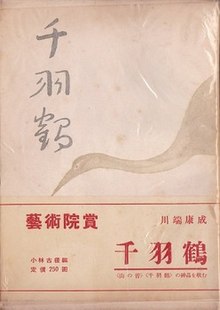Thousand Cranes

First edition
|
|
| Author | Yasunari Kawabata |
|---|---|
| Original title |
千羽鶴 Senbazuru' |
| Country | Japan |
| Language | Japanese |
| Genre | Novel |
| Publisher | Kawabata Publishing |
|
Publication date
|
1952 |
|
Published in English
|
1964 |
| Media type | Print (paperback) |
Thousand Cranes (千羽鶴 Senbazuru?) is a 1952 novel by Japanese author Yasunari Kawabata. The novel is divided into five episodes: "Thousand Cranes", "A Grove in the Evening Sun", "Figured Shino", "Her Mother's Lipstick" and "Double Star".
Set in a post World War II Japan, the protagonist, Kikuji, has been orphaned by the death of his mother and father. He becomes involved with one of the former mistresses of his father, Mrs. Ota, who commits suicide seemingly for the shame she associates with the affair. After Mrs. Ota's death, Kikuji then transfers much of his love and grief over Mrs Ota's death to her daughter, Fumiko.
Red & White
Decay The tea ceremony decays throughout the novel. It is no longer used for traditional Japanese purposes. Chikako has turned it into a tool for her to meddle with Kikuji's life. She spreads this poison. Tradition is falling apart due to hate.
Fate/legacy/inheritance Kikuji is unable to escape the life that his father left him, but he is also not willing to. He inherits all his burdens and drama. Kikuji is a "modern" man as displayed by the fact he is a bachelor, and conducts casual sexual relationship with modern women. Despite this Kikuji actively chooses to obsess over the past. The reason for this is because in 1950s Japan was in a transient state between being connected and in tune with cultural practices of the past, whilst beginning to adopt westernised, modern cultural and social practices. This had massive effects on sexuality. As male sexuality, and therefore male identity, was supported by the subjugation of female sexuality, when economic and social modernity opened up new opportunities for women to have independence, women were no longer shackled to the household, and their approaches to sexuality changed. Thus, male sexuality and male identity which was superior on the basis of the subjugated, subservient female, was destabilised. Therefore, Kikuji's obsession with his father's sexuality is because he feels emasculated by the females who surround him, and so he is trying to establish a sense of agency which he aligns with his father, and the generation his father represents.
...
Wikipedia
